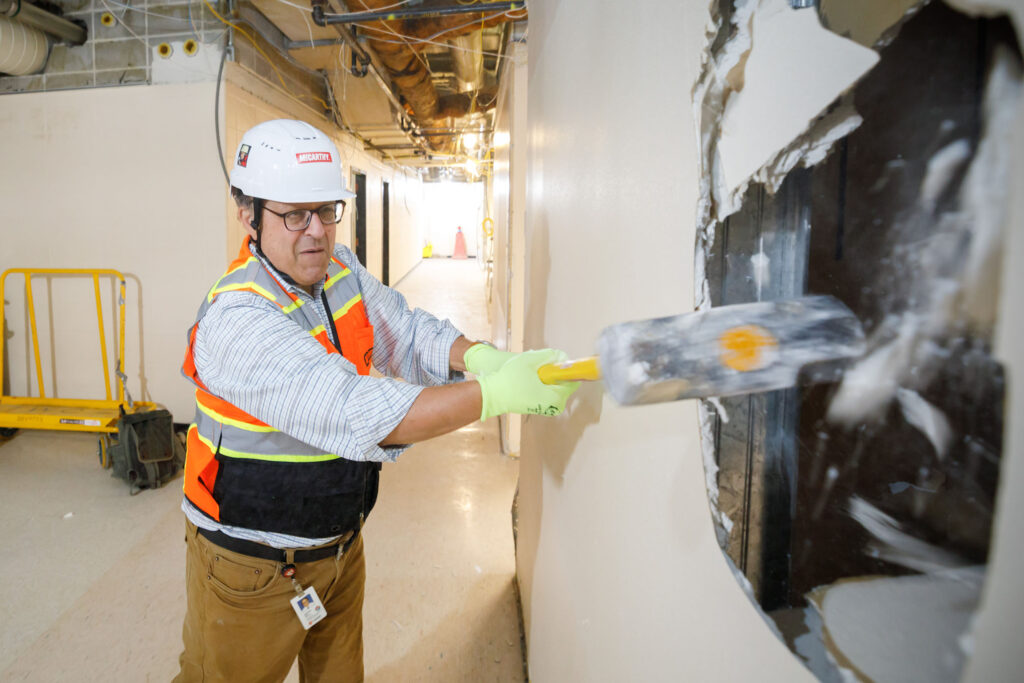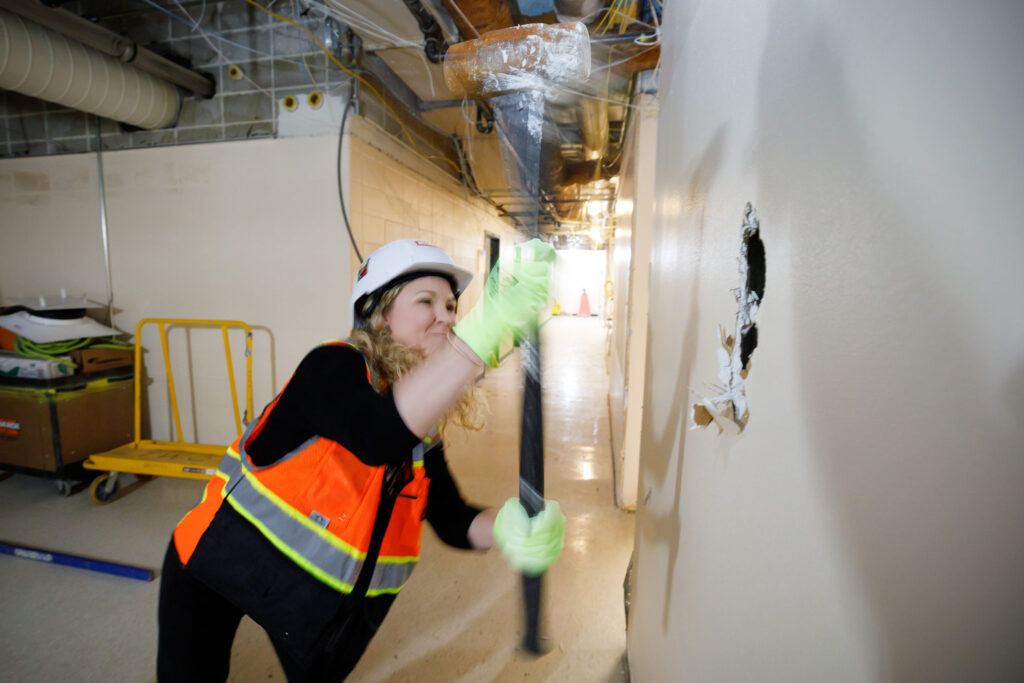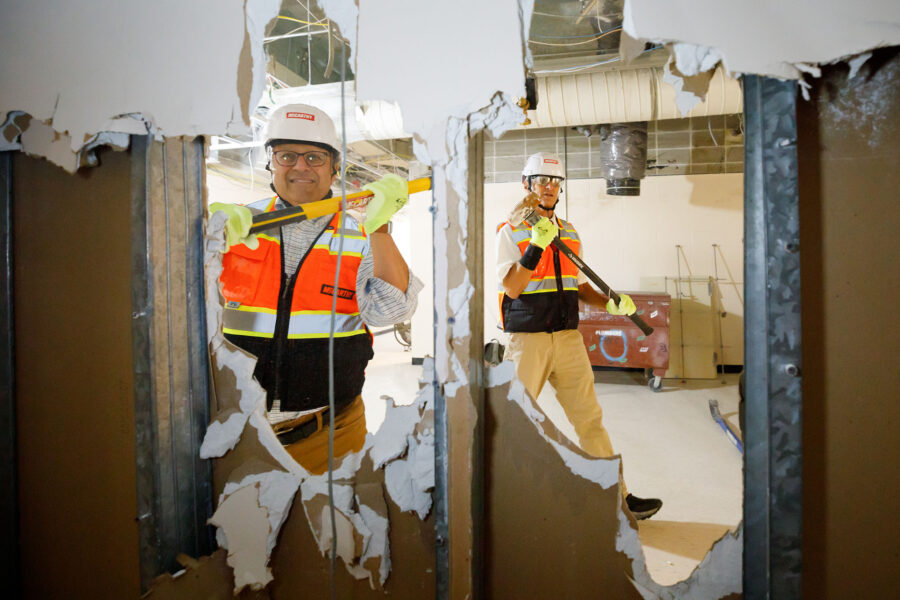Matthew Rizzo, MD, the director of the Great Plains IDeA-CTR, describes data and information as the oxygen that the health system breathes.
Now powerful tools for analyzing data – including artificial intelligence, also known as AI, and its close partner, machine learning – are rising in prominence across society and here at UNMC. In those tools’ ever-increasing power, Dr. Rizzo sees great potential to elevate clinical research, model diseases, inform novel health interventions and form new preventative approaches toward people’s health.
Last month, partners from across UNMC, led by the Great Plains IDeA-CTR, started a renovation project that will bring together some of the med center’s leading researchers and data experts, as well as attract leading experts, at a new biomedical informatics laboratory. It will be UNMC’s first dedicated, shared computational lab.
The Biomedical Informatics, Bioinformatics, Clinical Research and Innovation Hub will be housed on Eppley Science Hall’s sixth floor. On Aug. 7, representatives from the IDeA-CTR and the UNMC College of Medicine swung a hammer to kick off the renovation work.
Financially, the project is being supported by the National Institutes of Health and its National Institute of General Medical Sciences through a supplemental application to the Great Plains IDeA-CTR parent award, as well as State of Nebraska building accessibility funds and internal funding committed by UNMC.
Construction is due to be completed by spring 2024.
“This shared space is a headquarters and idea factory,” said Dr. Rizzo, who also is professor and the Frances & Edgar Reynolds Chair of the UNMC Department of Neurological Sciences. “It will connect key stakeholders –– including users, clinicians, researchers and students –– with patients, families and caregivers.
“Together, they will work to improve population and individual health, the health care experience, clinician well-being and health equity, with access to affordable care for all, everywhere.”
Howard Fox, MD, PhD, a professor in the UNMC Department of Neurological Sciences and senior associate dean of research and development for the UNMC College of Medicine, said artificial intelligence, machine learning and the field of data informatics already are having a large impact on research and clinical decision making.

Dr. Fox said biomedical research generates large data sets from activities such as performing genomic sequencing, and clinical care generates its own massive data sets. Through the extraction, linkage and analysis of that information, the field of data science has become key to basic and clinical research, he said.
Within the newly remodeled space, Dr. Fox said, data science practitioners will implement their data science methods, work closely with other investigators and form agile, collaborative teams to address a range of research needs.
Organizers behind the project cited a number of existing research efforts that highlight the importance of the field: clinical research informatics specialist Jerrod Anzalone’s work with the National COVID Cohort Collaborative (N3C); precision medicine work led by Babu Guda, PhD, professor and vice chair of the UNMC Department of Genetics, Cell Biology and Anatomy; and the work of Scott Campbell, PhD, in the Clinical Research Analysis Environment project and partnership with the Nebraska Public Health Lab.
To build on the momentum, the UNMC College of Medicine is committed to hiring at least four new faculty members in the field of data science. The first hire in that group is Jieqiong “Jojo” Wang, PhD, an assistant professor in the UNMC Department of Neurological Science and an expert in machine learning, medical image analysis and neuroscience.
Dr. Rizzo said that although all types of clinical and translational research are increasing, UNMC identified that growing the lab spaces that support AI and machine learning research is a high priority.
Importantly, these new faculty also will be instrumental in the education realm.
Said Dr. Fox, “Training the next generation of investigators performing and working with data science is an important part of our mission to ensure the growth of this field at UNMC and our clinical partners.”

Among the features of the new research hub:
- Close proximity to other collaborators. Experts in one clinical data domain will work closely with other experts to generate impactful new analytic approaches.
- Computational pods for teams. These workspaces will provide a home for individuals and teams to encourage collaborative programming.
- “Huddle” rooms. These will be small, glassed rooms where scientists can gather.
- Improved IT bandwidth and speed.
- Expanded regional capacity. The lab will provide space to UNMC partners at regional Great Plains institutions through the Great Plains IDeA-CTR network.
Dr. Rizzo said project organizers hope the renovated space creates a “think tank” in which faculty researchers, research assistants and strategic partners work alongside one another in addressing emerging big data issues.
“With this strategic faculty and facilities growth,” he said, “we are building and balancing needs for artificial intelligence, machine learning and clinical research informatics for all the patients and communities we serve.”
